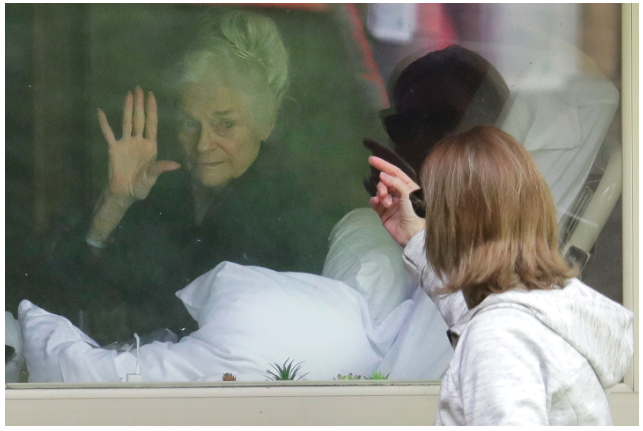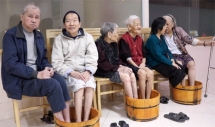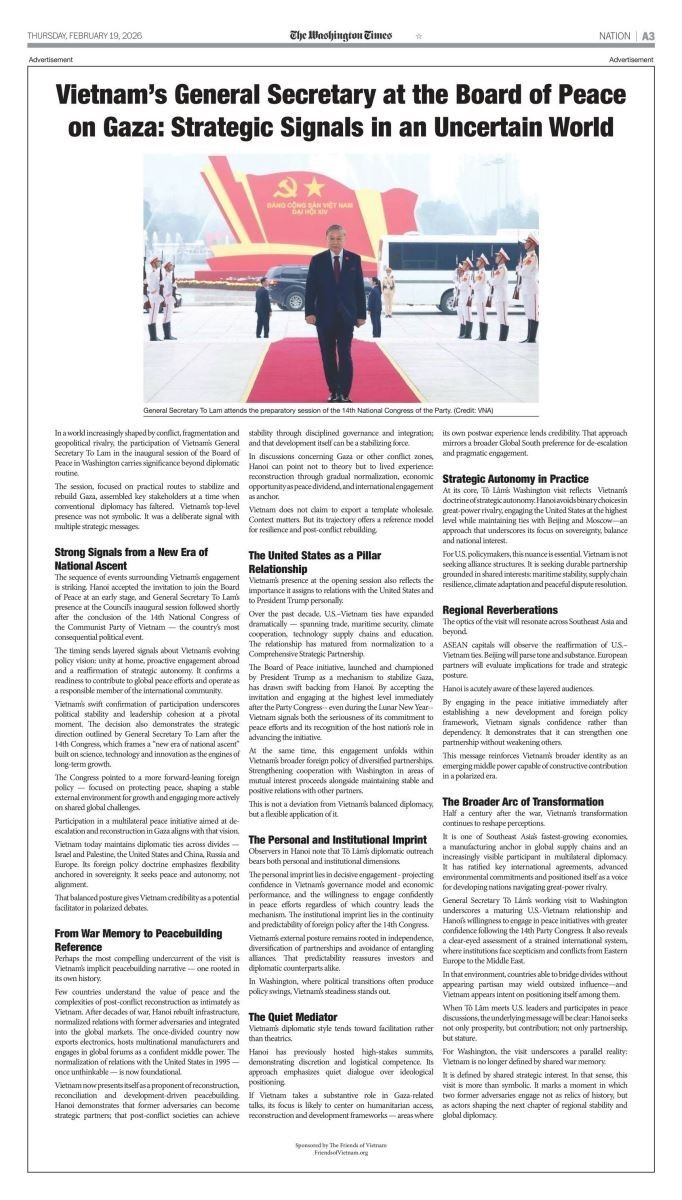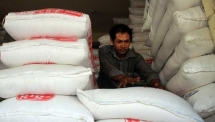Coronavirus cases surge: ‘almost perfect killing machine’ at nursing homes as workers battle
| Rice exports: Cambodia surge | |
| COVID-19 outbreak: Egypt confirms first case as death toll in China surges past 1,500 | |
| US doctor provides free surgery for Vietnamese children |
At least 55 coronavirus deaths, one quarter of all fatalities, have occurred in elder care facilities, a Washington Post review finds
 |
| Judie Shape, left, who tested positive for the coronavirus, waves to her daughter, Lori Spencer, on March 11 at the Life Care Center in Kirkland, Wash., near Seattle. (Ted S. Warren/AP) |
Across the United States, the numbers of reported cases of coronavirus at nursing homes, assisted living facilities and other elder care centers have spiked, with at least 73 facilities in 22 states reporting infections, according to a review by The Washington Post of reports from states, local media and nursing homes.
The dangers the coronavirus poses to older people have been well documented, and in a nursing home, the virus can move quickly from person to person and be particularly lethal.
Indeed, in late February, an outbreak at the Life Care Center in Kirkland, Wash., showed just how deadly the virus could be in such settings: At least 129 cases have been reported, and 35 people have died. After that outbreak, at another home in New Orleans, five people died one week.
The Kirkland deaths, government and nursing home officials say, spurred their preparations. But as the recent surge in infections shows, some of the defenses may have been deployed too late to slow the virus, while others have been undermined by the same shortages that have constrained the U.S. response to the coronavirus.
Some nursing homes are not requiring workers to use “personal protective equipment” — disposable masks, gloves and gowns — because of potential shortages, the inconvenience and costs, The Post found. Nationally, some health officials are worried about running out of the protective gear that, among other things, is supposed to prevent the virus from sidelining nursing home workers, firefighters, EMTs and other emergency responders.
Moreover, there are few signs that state health departments are thoroughly testing residents and staff at nursing homes even after an outbreak. At several homes where residents have tested positive, officials are testing only those already showing symptoms, even though some carrying the coronavirus show no symptoms at all.
The agency regulates more than 15,000 nursing homes across the country that receive federal Medicaid funding.
“America’s patients and providers should rest secure knowing that we are taking aggressive precautions to safeguard your health,” CMS Administrator Seema Verma said in a statement announcing the rules March 9.
Despite assurances, nursing home residents and their loved ones often feel adrift, unable to decide where a person would be best protected from the virus.
“Should I pull him out of there? What should I do?” Elizabeth Penner, a Seattle lawyer whose 71-year-old father is in a retirement home, said earlier this week.
Her father’s facility, the Lakeshore, has had two positive coronavirus cases, one on March 14 and another on March 18.
She worried officials seemed unable to test quickly enough to separate the healthy from the sick.
“There’s completely insufficient resources to deal with what they know is coming,” said Penner, 32, her voice cracking.
She also has a husband, 3-year-old son and two stepchildren who shuttle between homes and could infect her father if he stayed with her.
Her father was not tested until Wednesday and on Friday learned his results were negative. She felt he was safest staying put.
‘This could happen anywhere’
Approximately 1.3 million people resided in federally certified nursing facilities in 2017, the most recent data available, and another nearly 1 million were in assisted living or retirement communities, according to the Kaiser Family Foundation (KFF), a health policy research organization.
Nursing facilities have accounted for a significant number of deaths because they can turn into breeding grounds for illnesses, the foundation said in a policy brief released after the outbreak in Washington state. Facilities often are densely packed with elderly or sick residents sharing a room. Infection and respiratory issues are common.
Most people who contract the coronavirus have mild symptoms, but the elderly and those with diabetes or heart or lung disease are at higher risk of falling severely ill, or dying. Approximately 16 percent of all nursing home residents nationwide underwent treatment for a respiratory illness in 2017, according to the analysis.
“The grim reality is that, for the elderly, covid-19 is an almost perfect killing machine,” said Mark Parkinson, president and CEO of the American Health Care Association (AHCA), during a recent CNN interview.
Outbreaks at several facilities raised alarm because of how quickly they spread to other residents: At one nursing home near Chicago, 46 residents tested positive, state officials reported this week. At another in Lander, Wyo., eight tested positive, and one in New Orleans has 23 cases, including five dead.
One critical issue is a shortage of basic supplies, such as alcohol-based hand sanitizer or the personal protective equipment that helps prevent workers from contracting the virus and spreading it from one patient to another as they make the rounds.
Among challenges at nursing homes, aside from the vulnerability of residents, is that one worker, if infected, can become a “super-spreader,” said Lauren Ancel Meyers, a professor at the University of Texas at Austin who has studied infectious-disease surveillance.
While several nursing assistants interviewed say they have not been ordered to use the personal protective equipment at their nursing homes, Sweet said they probably should be. While nursing home aides are required to use gloves when carrying out some tasks, the presence of the coronavirus means such workers also could be wearing masks and face shields to prevent spreading the highly contagious virus.
State health officials limit testing
While President Trump said two weeks ago that “anyone who wants a test can get a test,” several administrators and residents say state public health officials have refused to test all residents in facilities in which there has been an outbreak.
Despite the example of the Life Care Center, where an infection quickly spread to dozens of residents, state officials responding to some nursing home outbreaks are not testing all residents — that is, until they show symptoms. But by then, the disease may have spread.
At the Lambeth House in New Orleans, site of one of the deadliest nursing home outbreaks, testing did not begin until two days after a resident reported symptoms and checked into a hospital.
The facility immediately restricted interaction among residents, canceled all communal events, closed the cafe and wellness center, and prohibited any nonessential people from entering the property, Lambeth House spokesman Greg Beuerman said.
But testing has been limited to patients who have displayed symptoms. By Thursday, five residents, all men between ages 80 and 98, were dead. Eighteen others have tested positive.
“Hospitals have made it quite clear they don’t have the capacity to house everyone who comes down with the virus,” Beuerman said. “So, unless there are any other issues they are sent back [to Lambeth].”
 | Vietnam faces serious shortage of qualified nursing care workers for elderly Vietnam is facing an alarming shortage of qualified nursing care workers for the elderly. Most elderly people are cared for by their relatives or domestic ... |
 | Elderly Vietnamese turn to nursing homes for companionship and healthcare These pensioners in Hanoi are bucking the traditional trend in their later years. |
| AO victims in Bac Giang province to enjoy nursing and detoxification house Agent Orange victims in the northern province of Bac Giang will have a chance to enjoy better care after a nursing and detoxification house was ... |
Recommended
 World
World
US Media Commend Vietnam’s Role in Global Peace Efforts
 World
World
Vietnam Officially Becomes Association Country of International Energy Agency (IEA)
 World
World
Key pacts signed as PM Modi hosts France's Macron for plane cooperation
 World
World
India, Canada commit to strengthening bilateral ties, discuss trade
 World
World
AI Summit India 2026 Live Updates: ‘Bringing the world together,’ PM Modi welcomes leaders as India hosts AI summit
 World
World
Safran ready to open India engine production in Rafale deal
 World
World
Nepal interim PM Sushila Karki thanks India for March support
 World
World



